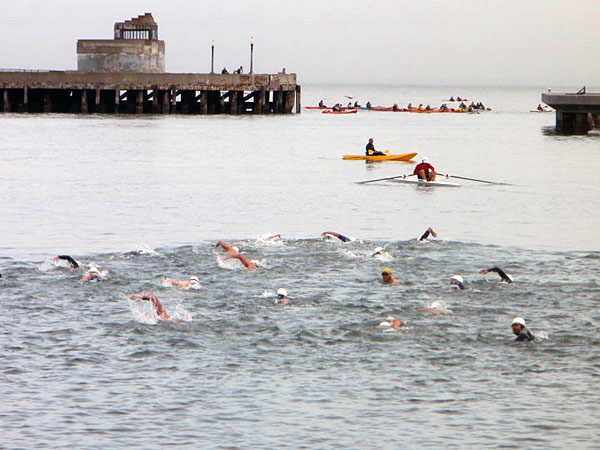Triathlete/Open Water

All too often we hear open water swimmers, triathletes in particular, make general statements about "pool swimming" not being as helpful as swimming in lakes or oceans. They seem to feel strongly that they have to swim in water that is similar to race water…all the time. While I don't think anyone is going to argue that you need that experience and acclimation, the pool can be your best friend when it comes to improving your swimming. But don't take our word for it, read what a few of our friends have to say...
"If you're not swimming 80% of your training time in a pool with a coach and a pace clock, you will never reach your potential for open water swims. All triathletes and open water specialists don't just practice in a structured pool environment.
Stroke mechanics, pacing and intensity of the sessions are all heightened in a Masters or triathlete-specific swim workout.
Recognize that open water swim practice is paramount for open water races. As they approach the race season, most accomplished open water swimmers will include one day every week or every other week in open water. The nuances of open water sessions will further enhance your pacing (intensity), develop "sighting" techniques and elevate the mental tenacity of steady state swimming.
Lastly, if you master your technique with a coach in a controlled pool environment, your overall economy and efficient will be elevated when you test your skill in open water."
–Dave Scott
6-time Ironman Triathlon World Champion
http://www.davescottinc.com"Training in open water can be a valuable tool to prepare for a triathlon. However, swimming is a highly technical sport, and pool swimming is the best way to produce the repetition, feedback, and analysis necessary to make improvements in a swimmer's stroke."
–Victor Plata
2004 United States Olympic Triathlon Team
USA Triathlon Board of Directors
United States Olympic Athlete Advisory Committee"As an open water swimmer, triathlete, and ultra adventure swimmer who has completed a number of ultra distance swims throughout the world, I find it important to not only get quality time in the open water, but also to maximize time in the pool. Training in a pool allows me to work on the basics as well as test my progress in a controlled environment. Having a coach that understands open water swimming is also extremely important."
–Jamie Patrick
Ultra Adventure Swimmer
2010 Double Crossing Swim – Lake Tahoe – 44 miles
75 + Open Water Swims
100 + Triathlons
3 Marathons"Training in a pool can be a great tool that open water/triathletes use to improve their speed and endurance. While you're training in open water, there is no way for you to know how fast you're going. By training in a pool and watching a pace clock, you can monitor your progress and work on improving your speed. Interval training and timed swims are essential to improving. Swimming in a controlled environment also allows you to work on your stroke more than you would be able to in the ocean. By utilizing both open water and pool training environments, you will maximize your potential."
– Chloe Sutton
2008 Olympian
2008 FINA World Open Water Swimming Championships – bronze
2006 & 2007 Pan American Games – gold in 10k Open Water"There are many components to prepare for in an open water swim race or triathlon swim leg. It is important to incorporate pool swimming along with your open water training to fully familiarize yourself with what to expect in a competitive event. In order to reach your full potential as an open water athlete or triathlete, you should base your swim training on the 7 elements of The Pyramid of Open Water Success: Base training, speed training, distance tolerance, skill training, acclimatization, skill training, race specific training, and tactical knowledge. These components can be developed both in the pool and open water.
It is effective to have speed at the beginning of a race since most competitive events consist of a mass start of other swimmers to battle through. You also want to be able to have speed at the end of your race to finish strong. Sprinting can be done in the pool to help moderate your times at consistent distance. This way you can record your times and note your weekly/monthly progress.
You must also have endurance in order to complete the swim. Interval training in a pool can help regulate your pace to supplement long open water swims.
Strategy, tactics, and the rules of open water swimming can be practiced in a pool.
Pool Open Water (POW) can be simulated at any facility.
Open water swimming is for anyone - competitive, noncompetitive, or solo swims - and pool swimming can benefit whatever personal goals you may have in open water."
– Lexie Kelly
Open Water Source
We have several options for the triathlete and/or open water swimmer:
1. An indoor, 8 lane, 25 meter pool that is open all year.
2. A Masters program that offers a coach on deck leading practice.
3. Private coaching.
4. Underwater video recording to help analyze your strokes.
We urge you to take advantage of what we offer at the Swimstitute.
We don't have all the answers, but we don't have to look far to find them...
